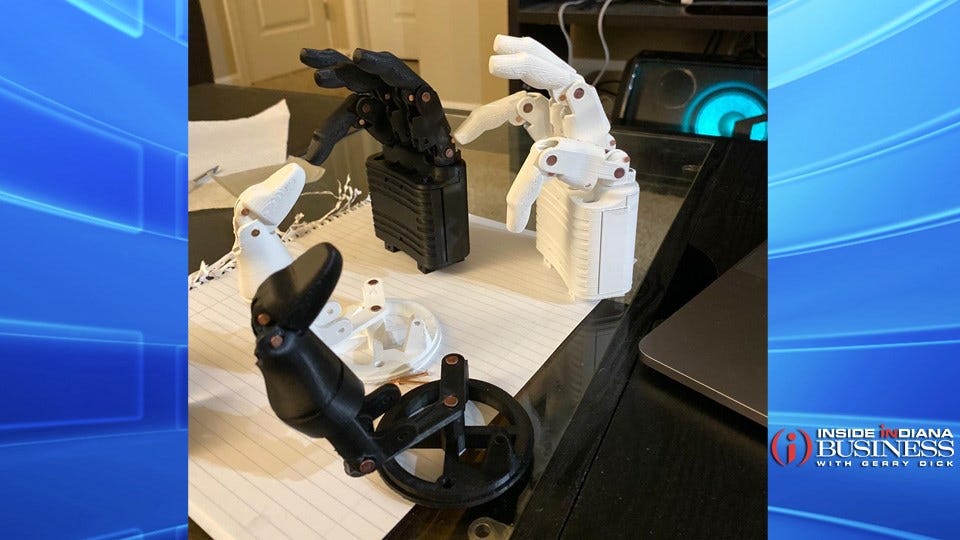South Bend Startup Creates High-Tech, Inexpensive Prosthetic Hand

Subscriber Benefit
As a subscriber you can listen to articles at work, in the car, or while you work out. Subscribe NowA team of recent University of Notre Dame alumni—and soon-to-be graduates—is creating a high-tech prosthetic hand they believe will change the lives of amputees. ProstheTech Chief Executive Officer Jose Montalvo says a myoelectric prosthetic hand typically costs between $15,000 and $100,000, but the South Bend-based startup says it’s developing a higher-tech, more functional hand for a fraction of the cost.
As a high school student in his native country of El Salvador, Montalvo met a gardener whose hand had been amputated, but he couldn’t afford a prosthetic.
“$15,000 could be half of someone’s annual salary here in the U.S., and in El Salvador, that’s 10 times a person’s annual pay. People in third world countries are struggling to get prosthetic hands, but if they can’t prosthetics, they’re unable to keep doing their job and support their families,” says Montalvo. “That stuck with me. I thought, ‘If I study electrical or mechanical engineering, I can do something about this.’ That’s why I chose my career path.”
After earning his degree in electrical engineering, Montalvo, another Notre Dame alumnus and two current students founded ProstheTech. The team says its prosthetic hand improves upon standard myoelectric technology, which uses sensors on the skin to “listen” to muscle movements.
“Is the muscle sounding like this? Then the person is trying to point, close her fist or open her hand,” says Montalvo. “Depending on what the muscle signal is—how the muscle ‘sounds’—it emits electric activity. [Myoelectric prosthetics] can capture that, then figure out what the person is actually trying to do.”
Montalvo says the startup’s myoelectric prosthetic hand has a much shorter learning curve for the amputee. The device incorporates a machine learning algorithm “that help the person ‘train’ the hand much faster.” Montalvo describes the machine learning algorithm as “basically, just a matrix of numbers; imagine a bunch of ‘ifs.’”
“If this happens, then something else will happen. Machine learning algorithms go into the first ‘if,’ and if something similar to what it was expecting happens, then it enters that one,” says Montalvo. “It’s like a rabbit hole; it goes to one level, then another level and another level. Once it reaches a level where it can’t go any further, it decides the person is definitely trying to point, for example. Or if it bumps it a level above, that means the person is trying to open their hand.”
The startup says conventional prosthetics require about two months to train the hand how to translate various electric signals into specific movements, but ProstheTech’s device learns each hand gesture in about 90 seconds.
ProstheTech expects the hand to cost less than $10,000. Montalvo says the startup keeps costs low by making the chips and everything on the motherboard in-house, “so we don’t need to use commercial ones that are really expensive.” The startup 3D prints much of the device, using plastics and carbon fiber mixes, which it says are the best materials available and also inexpensive.
Boosted by a recent $20,000 investment from Indianapolis-based Elevate Ventures, ProstheTech is working to finalize the device and plans to start selling a demo version for initial testing in the coming months. As a class 1 medical device—”about the same as an Apple Watch,” says Montalvo—the hand will require the lowest level of regulatory approval.
ProstheTech plans to begin testing the device with amputees in February; Hoosiers in South Bend will be among the testers, as well as people in Atlanta, New York and even patients at the only prosthetic clinic in El Salvador. Several people are already using the device in the Central American country through ProstheTech’s partnership with the clinic. The startup plans to have the hand on the market by the end of 2020.
“[Testing] will give us real data…we can get better feedback from more people and know what to improve, so we can make it work well for the people who want it and need it,” says Montalvo. “We’re excited to be able to provide something that people can afford and they’re able to use to go back to their normal life.”
Montalvo says the technology used for the prosthetic hand could be a stepping stone to develop prosthetic devices for other applications.
ProstheTech will soon be located at Notre Dame’s IDEA Center, which Montalvo says will provide access to critical resources.
